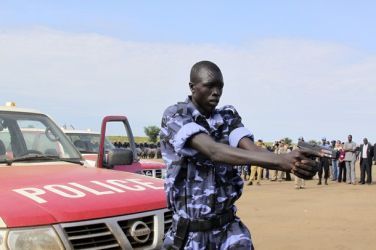S. Sudan’s interior ministry says illegal migrants pose security threat
February 5, 2013 (JUBA) – South Sudan’s internal security is at risk partly due to the surging influx of illegal migrants, the deputy minister of interior, Salva Mathok, says.

Juba is currently home to tens of thousands of undocumented migrants from all over the world, principally from the neighbouring countries of Kenya, Uganda, Ethiopia, Eritrea and even Somalia.
Mathok says illegal migrants were increasingly involved in criminal activities and are also threatening to destabilise the young country.
“We will not sit in the offices further than this now, otherwise after a year, they [illegal migrants] will swallow up the whole [of Juba] city and then be[come] gangs of criminals,” said Mathok.
Asked what measures are being taken to crosscheck the background of immigrants, Mathok said thorough checking will be done in the border areas of Nimule, Aswa and Nesitu.
Other border points of concern include Upper Nile, Warrap, Unity and Western Bar el Ghazal states, which are considered the “worst parts” of the country in terms of the numbers of foreign nationals entering and where “commissioners have taken up everything,” including migration work, Mathok added.
Many businesses and jobs are taken up by foreigners in South Sudan, including casual work. Although there is no official restriction on immigration, those found without passports or visas are deported.
When asked to clarify on what specific steps were being taken against illegal migrants, Mathok declined to elaborate further, saying the president must first accept the proposed measures.
South Sudan relies heavily on imported goods, including food stuffs. Relations between South Sudanese and other East Africans has deteriorated since South Sudan’s independence in 2011, with migrants not only blamed for increases in crime but educated migrants often take jobs in companies, organisations and the United Nations, which are coveted by locals.
To compound the matter East Africans are often paid more than their South Sudanese colleagues.
(ST)
